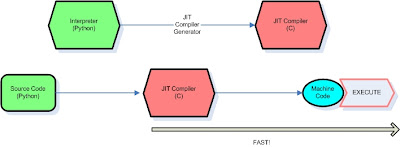This is how Python currently runs programs.

Suppose the interpreter is in Python instead of C. Ignoring performance, this would be a great setup since we could work in Python rather than C. But we cant ignore performance! This setup would be slow.

So if we have to get back to the speed levels of the existing CPython setup, we would have run an interpreter based in C rather than in Python. How about we keep the source file of the interpreter in Python but use a translator to convert the code to C? Then we can still write the interpreter in Python and also get a functioning interpreter that’s fast as C.

But are we sure that a translated interpreter will always be as fast as or faster than the original C interpreter? Are there other ways we can increase the speed of this setup? Yes! Instead of just a translator, use the JIT (just-in-time) compiler-generator to generate a JIT compiler out of the Python interpreter.

Points to note:
- The interpreter written in Python in PyPy is actually written in RPython, a restricted version of Python that is statically-typed. This is to enable generation of a more-efficient program for the target platform.
- The JIT Compiler generated uses a different approach than the JIT compiler that can be generated for the CPython version (Psyco) and according to the PyPy site has demonstrated superior performance, even though its still a work in progress.
Pretty good description. One tiny nitpick: Psyco has been written by hand, not generated. That's indeed one of the problems of Psyco, it was just too much work.
ReplyDelete